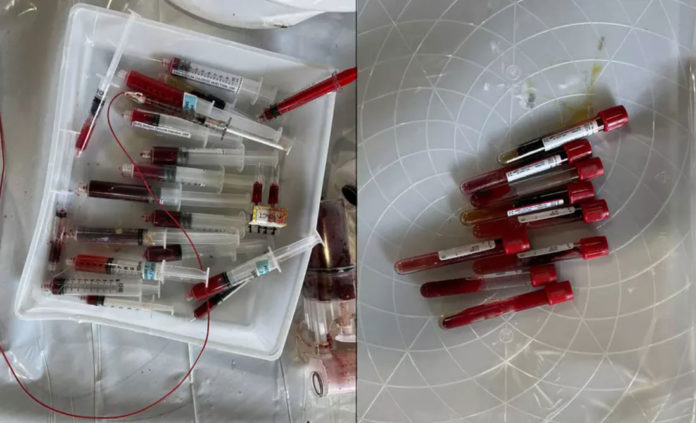
Santa Clara County supervisors —and the public—on Dec. 12 got their first public explanation from county officials on the explosive revelations a week earlier that county-run hospitals had for at least a year illegally dumped medical waste, drugs and patient data into dumpsters.
Healthcare officials and the Board of Supervisors first learned of the revelations in September, but took no action for two months, this newspaper learned.
Healthcare Services CEO Paul Lorenz told the supervisors’ Health and Hospitals Committee and his boss, County Executive James Williams, that they had been taken by surprise that dumpster-diving investigators with the county District Attorney’s Office had found “tens of thousands” of examples of illegal waste disposal at county hospitals—and by a pledge from District Attorney Jeff Rosen that he will go to court to seek civil penalties against the county for violations of state health laws.
“The public needs to know what happened, and the county will not get a free pass when it comes to environmental protection and consumer privacy laws,” Rosen warned.
At the Dec. 12 committee meeting, Lorenz did not dispute the DA’s findings.
At the same time, while taking responsibility for managing hazardous and biological waste, county officials on Wednesday said that private contractors—not hospital employees—had been hired to handle much of the material identified by the DA. The county did not identify the contractors.
The DA’s office, however, countered that county hospital employees, not contractors, likely are at fault.
When asked by committee chair Supervisor Joe Simitian “What’s the situation with medical waste?” Lorenz said the county “took immediate action”—but not until after getting a more detailed report from Rosen in late November.
“We did not receive specifics until November,” Lorenz told the supervisor. “We did acknowledge the seriousness of the violations.”
Lorenz listed a half-dozen specific steps he said he is taking to improve oversight of the waste removal process at hospitals and healthcare centers in the state’s second-largest public hospital system. Williams did not comment on the issue at the meeting.
A county spokesman had released Lorenz’ list on Dec. 11 to this newspaper.
The statement said that in November, the hospital system “took immediate action by directing and providing guidance to all staff and providers to ensure they are properly disposing of hazardous waste, medical waste, and protected health information.”
Lorenz told the committee he is:
- Developing educational materials and providing training to staff
- Designating liaisons to assist with training and implementing necessary changes
- Designating a specific email address for staff to submit questions and concerns about waste disposal
- Evaluating vendors to provide both immediate on-site sorting and compliance verification and to ensure sustainable proper waste disposal practices
- Reviewing and updating policies and procedures
- Creating an internal and external auditing program to assure long-term compliance
Simitian said he would ask the full board to direct Lorenz to provide written summaries in March of the progress of his efforts to improve the hospitals’ waste disposal efforts.
“This is a very significant problem and we need to take it very seriously,” said Supervisor Otto Lee, the other committee member.
Simitian, Lee and other supervisors, as well as Williams, were informed in mid-September that Rosen was investigating serious and illegal waste disposal problems at county hospitals, and did nothing at the time—no public discussion or directives to staff.
The county’s only public response to Rosen’s allegations came on Dec. 6, when the hospital system released a brief statement the media that included the promise that “we are committed to adopting industry best-practices to prevent future occurrences and upon learning of the details three weeks ago, immediately began implementing corrective actions to address the concerns.”
In his response today to Simitian’s question, Lorenz described solutions, but offered no details of how thousands of waste products could have been illegally dumped for months, without any apparent knowledge of senior managers. And he gave no details of the county’s relationship with the contractors who handled the waste.
The DA’s office said it could be months before complaints of waste disposal violations by the county hospitals are resolved.
“The filing of a civil complaint and a stipulated judgment in Superior Court will most often occur only after there is return to compliance, followed by a negotiated settlement approved by a judge,” the DA’s office said in an email. “It could take months, a year, or longer for a large health and hospital system to get into compliance.”
County officials—including Williams, Rosen and the Board of Supervisors—were first told three months ago, on Sept. 9, of illegal waste disposal problems at Regional Medical Center, which the county had just decided in August to buy from HCA Healthcare and add to the county hospital system, the DA’s office said.
Then on Sept. 20, these same officials received a letter with more bad news: that the dumpster investigation had been expanded to the county’s three hospitals and found similar problems.
The county claimed that “the first time Santa Clara Valley Healthcare was provided with specific information about the investigation findings was Nov. 18” and only began “corrective actions” at that point.
The county—including Williams and his communications staff as well as Board President Susan Ellenberg and the board clerk—has ignored requests for copies of correspondence between the DA and the county, or among county officials about the waste disposal issue.
There was no response to Rosen’s Dec. 5 press conference—at which the DA displayed large photos of bloody human waste and piles of illegal drugs and syringes—at the Dec.10 Board of Supervisors meeting, only last week’s brief public statement by county staff.
The DA’s Office said this week the county inquiry began after the county settled a similar case with Kaiser Permanente, which had been sued for illegal disposal of medical waste, hazardous waste and patient information in a case that was settled in September 2023. Recognizing that Santa Clara County operates a large and expanding healthcare system, Rosen decided to check out whether county hospitals might have similar violations.
Santa Clara County is one of a number of counties in the state that have been given the authority and responsibility to enforce state laws regulating hazardous and medical waste disposal. The county’s own Department of Environmental Health, which reports to Lorenz, is the designated regulatory agency for county public and private hospitals with regard to waste disposal.
Rosen’s office said it would not discuss what it called “confidential communications” with the county about the ongoing investigation.
“We anticipate that the county will cooperate and provide information as to corrective actions that it takes to address these violations,” the DA’s Office said in a statement.
This story was first published by San Jose Inside.







